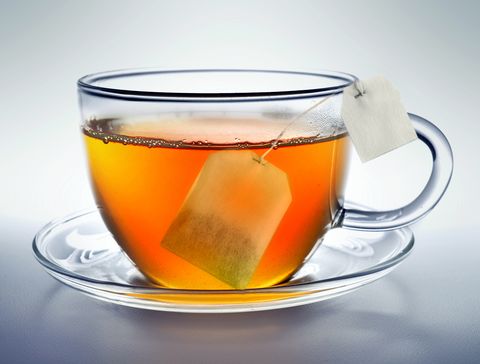Judging from our local coffee shop’s drive-thru line, which snakes out onto the street and up the block every morning, coffee dominates the morning caffeine scramble for a lot of people. But tea actually outshines coffee worldwide. Here are some other facts that may surprise you:
It’s the most widely consumed drink in the world. After water, tea is the most popular drink for people around the globe. China, Turkey, and the U.K. have some of the biggest tea drinking populations. On a given day, half of all Americans drink it — though the vast majority is consumed as iced tea.
It’s a heart-healthy drink. One popular tea brand got approval from the FDA to display a health claim on plain black and green tea that states, “Can Help Support Heart Health.” Tea contains natural plant compounds that are known to be heart-healthy, and studies have found tea drinkers to have lower rates of heart disease.
It’s basically calorie-free. Like coffee, plain tea contains just a couple of calories per cup and no sugar. But what’s added can change that. A medium sweet tea and a large iced matcha latte from fast food restaurants both pack about 7 teaspoons of sugar. (The American Heart Association recommends no more than 6-9 teaspoons for the whole day).
It all comes from the same plant. Varieties may look and taste different, but all real tea originates from the Camellia sinensis plant. The varieties — black, white, oolong, and green — are made by processing the plant differently. For example, black tea comes from leaves that are exposed to the air longer (called oxidation) than green tea. Herbal teas, on the other hand, don’t come from that plant. Instead, they’re infusions of different plants.
It’s just as hydrating as water. You may have heard that beverages that contain caffeine somehow don’t “count” when it comes to hydration. But that’s actually not the case. Tea is more than 99 percent water, so tea’s hydrating qualities offset any diuretic effects.
It contains the same healthy compounds as broccoli. Flavonoids are natural plant compounds that have potential health benefits, and foods like grapes, berries, and broccoli all contain them. Tea is an especially rich source. According to a USDA database, 1 cup of black tea has 170 milligrams of flavonoids, while 1 cup of broccoli has about 3 milligrams.
It’s sometimes topped with cream cheese. Bubble tea is still enjoying popularity. (Is it bad for you? Read about it here.) But look out for the latest fad that’s brewing: cheese tea, which is topped with a frothy, foamy mixture of milk, cream cheese, and whipped cream and a sprinkle of sea salt. (It doesn’t exactly compete with plain tea as a healthy drink, but it might make a unique dessert!)
Source: https://blogs.webmd.com/food-fitness/20210816/7-facts-about-tea-that-may-surprise-you






